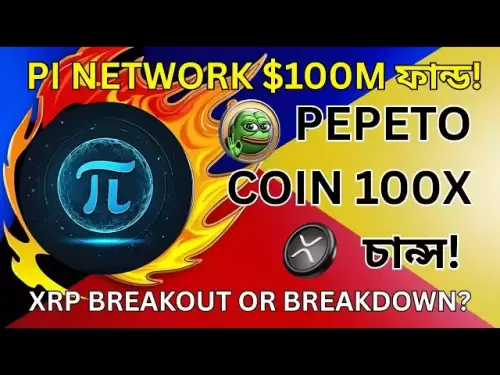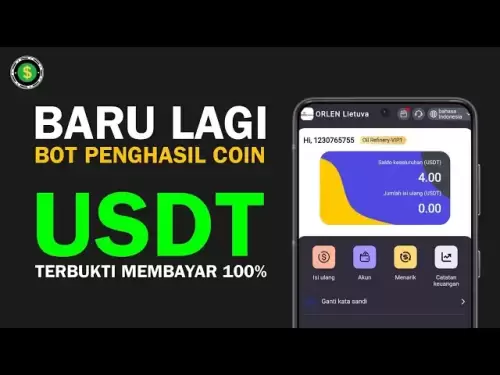-
 Bitcoin
Bitcoin $103,065.0500
-0.40% -
 Ethereum
Ethereum $2,461.6498
-3.18% -
 Tether USDt
Tether USDt $1.0002
-0.01% -
 XRP
XRP $2.3405
-1.40% -
 BNB
BNB $638.8244
-0.92% -
 Solana
Solana $165.2459
-1.14% -
 USDC
USDC $0.9998
-0.01% -
 Dogecoin
Dogecoin $0.2135
-3.26% -
 Cardano
Cardano $0.7379
-2.16% -
 TRON
TRON $0.2696
-0.89% -
 Sui
Sui $3.7821
0.58% -
 Chainlink
Chainlink $15.2392
-2.86% -
 Avalanche
Avalanche $22.1034
-3.21% -
 Stellar
Stellar $0.2844
-2.65% -
 Hyperliquid
Hyperliquid $25.7587
-4.01% -
 Shiba Inu
Shiba Inu $0.0...01408
-2.66% -
 UNUS SED LEO
UNUS SED LEO $8.9439
0.89% -
 Hedera
Hedera $0.1897
-2.40% -
 Bitcoin Cash
Bitcoin Cash $389.9562
-1.07% -
 Toncoin
Toncoin $3.0688
-1.10% -
 Litecoin
Litecoin $95.9058
-3.36% -
 Polkadot
Polkadot $4.5920
-2.92% -
 Monero
Monero $334.2372
0.38% -
 Bitget Token
Bitget Token $4.9607
-1.28% -
 Dai
Dai $0.9999
-0.01% -
 Pepe
Pepe $0.0...01206
-4.22% -
 Ethena USDe
Ethena USDe $1.0006
-0.04% -
 Pi
Pi $0.6884
-6.59% -
 Bittensor
Bittensor $419.7103
-1.48% -
 Uniswap
Uniswap $5.6903
-6.13%
Why is zero-knowledge proof safer? How does it prevent information leakage?
Zero-knowledge proof enhances cryptocurrency safety by verifying transactions without revealing sensitive data, thus preventing information leakage and reducing attack surfaces.
May 17, 2025 at 11:00 pm
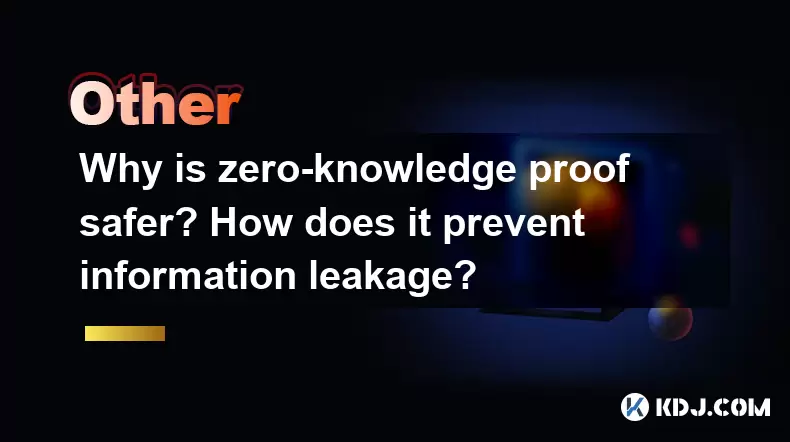
Zero-knowledge proof (ZKP) is a cryptographic method that allows one party to prove to another that a given statement is true, without revealing any information beyond the validity of the statement itself. This technology is particularly valuable in the cryptocurrency space, where privacy and security are paramount. In this article, we will explore why zero-knowledge proof is considered safer and how it effectively prevents information leakage.
Understanding Zero-Knowledge Proof
Zero-knowledge proof is a method that enables a prover to convince a verifier that they know a certain piece of information, without disclosing the information itself. This is achieved through a series of interactive protocols where the prover demonstrates knowledge without revealing the underlying data. The concept was first introduced in the 1980s by Shafi Goldwasser, Silvio Micali, and Charles Rackoff, and it has since become a cornerstone of modern cryptography.
In the context of cryptocurrencies, ZKPs are used to enhance privacy and security. For instance, Zcash, a privacy-focused cryptocurrency, utilizes zero-knowledge proofs to allow transactions to be verified without revealing the sender, receiver, or the amount transferred. This level of privacy is crucial for users who wish to maintain anonymity while transacting on the blockchain.
How Zero-Knowledge Proof Enhances Safety
Zero-knowledge proof enhances safety by ensuring that sensitive information remains confidential while still allowing for the verification of transactions or other claims. This is particularly important in the cryptocurrency world, where the risk of data breaches and identity theft is high.
One of the key safety features of ZKPs is their ability to prevent unauthorized access to data. By only revealing the validity of a statement and not the statement itself, ZKPs ensure that even if a malicious actor intercepts the communication, they will not gain access to the underlying information. This is a significant advantage over traditional cryptographic methods, which may require the exchange of sensitive data to verify a claim.
Moreover, ZKPs reduce the attack surface for potential hackers. Since the actual data is not transmitted, there is less information for attackers to target. This makes it more difficult for them to exploit vulnerabilities and compromise the security of the system.
Preventing Information Leakage with Zero-Knowledge Proof
Preventing information leakage is one of the primary benefits of zero-knowledge proof. In traditional systems, verifying a claim often requires the disclosure of sensitive information, which can lead to data breaches and privacy violations. ZKPs address this issue by allowing the verification process to occur without any information leakage.
The mechanism behind this is based on the concept of completeness, soundness, and zero-knowledge. Completeness ensures that if the statement is true, the honest verifier will be convinced with high probability. Soundness guarantees that if the statement is false, no cheating prover can convince the verifier. Zero-knowledge ensures that the verifier learns nothing about the statement beyond its validity.
In practice, ZKPs use complex mathematical algorithms to achieve this. For example, in a zero-knowledge proof of knowledge, the prover might use a series of challenges and responses to demonstrate that they know a secret, without revealing the secret itself. This process can be repeated multiple times to increase the confidence of the verifier, all while maintaining the privacy of the prover.
Applications of Zero-Knowledge Proof in Cryptocurrencies
Zero-knowledge proof has found numerous applications in the cryptocurrency space. One of the most notable is in privacy-focused cryptocurrencies like Zcash and Monero. These cryptocurrencies use ZKPs to enable private transactions, where the details of the transaction are hidden from the public blockchain.
Another application is in scalability solutions like zk-SNARKs and zk-STARKs. These are specific types of zero-knowledge proofs that allow for the verification of large amounts of data with minimal computational resources. This is particularly useful for blockchain networks that need to process a high volume of transactions efficiently.
Additionally, ZKPs are used in identity verification systems within the cryptocurrency ecosystem. For example, a user might need to prove that they are over a certain age to access certain services without revealing their exact age or other personal information. ZKPs allow for this verification to occur privately and securely.
Implementing Zero-Knowledge Proof in Cryptocurrency Transactions
Implementing zero-knowledge proof in cryptocurrency transactions involves several steps. Here is a detailed guide on how to use ZKPs in a typical transaction scenario:
Choose a ZKP protocol: The first step is to select a suitable ZKP protocol. Popular choices include zk-SNARKs and zk-STARKs, each with its own set of advantages and trade-offs.
Generate the proof: The prover generates a zero-knowledge proof that demonstrates the validity of the transaction without revealing any sensitive information. This involves using the chosen ZKP protocol to create a proof that can be verified by the network.
Submit the proof: The prover submits the proof to the blockchain network. This proof is typically included in the transaction data and is used by the network to verify the transaction.
Verification by the network: The blockchain network verifies the proof using the ZKP protocol. If the proof is valid, the transaction is accepted and added to the blockchain. If the proof is invalid, the transaction is rejected.
Maintain privacy: Throughout this process, the privacy of the transaction details is maintained. The network only learns that the transaction is valid, without gaining access to the sender, receiver, or amount transferred.
Challenges and Considerations
Implementing zero-knowledge proof in cryptocurrencies is not without its challenges. One of the main challenges is the computational complexity of generating and verifying ZKPs. These processes can be resource-intensive, requiring significant computational power and time.
Another consideration is the trade-off between privacy and transparency. While ZKPs enhance privacy, they can also make it more difficult to audit and monitor transactions on the blockchain. This can be a concern for regulatory compliance and fraud detection.
Additionally, the security of the ZKP protocol itself must be carefully evaluated. Any vulnerabilities in the protocol could be exploited by malicious actors, potentially compromising the privacy and security of the system.
Frequently Asked Questions
Q: Can zero-knowledge proof be used for all types of cryptocurrency transactions?
A: While zero-knowledge proof can be used for many types of transactions, it is most commonly implemented in privacy-focused cryptocurrencies like Zcash and Monero. For other cryptocurrencies, the decision to use ZKPs depends on the specific needs for privacy and the computational resources available.
Q: How does zero-knowledge proof affect the speed of transactions on the blockchain?
A: Zero-knowledge proof can impact the speed of transactions due to the computational complexity involved in generating and verifying proofs. However, advancements in ZKP protocols like zk-SNARKs and zk-STARKs are aimed at improving efficiency and reducing the time required for transaction processing.
Q: Are there any known vulnerabilities in zero-knowledge proof systems?
A: While zero-knowledge proof systems are designed to be secure, there have been instances where vulnerabilities were discovered in specific implementations. It is crucial for developers to regularly audit and update ZKP protocols to address any potential security issues.
Q: Can zero-knowledge proof be used to enhance the security of smart contracts?
A: Yes, zero-knowledge proof can be used to enhance the security of smart contracts by allowing for the verification of certain conditions without revealing sensitive information. This can be particularly useful in scenarios where privacy is a concern, such as in financial or identity-related smart contracts.
Disclaimer:info@kdj.com
The information provided is not trading advice. kdj.com does not assume any responsibility for any investments made based on the information provided in this article. Cryptocurrencies are highly volatile and it is highly recommended that you invest with caution after thorough research!
If you believe that the content used on this website infringes your copyright, please contact us immediately (info@kdj.com) and we will delete it promptly.
- Despite Struggling to Keep Upward Momentum, Bitcoin [BTC] Sentiment Remains Bullish
- 2025-05-18 06:50:14
- Binance and Kraken AI Tools Block Phishing Attempts Before Damage Done
- 2025-05-18 06:50:14
- Bitcoin Open Interest Cycle Signals Possible Consolidation Phase Ahead
- 2025-05-18 06:45:13
- Panama City May Be Planning to Set Up a Bitcoin Reserve
- 2025-05-18 06:45:13
- Solana (SOL) Had a Solid Q1 2025, as Its Chain GDP Grew by 20% QoQ to Reach $1.2B
- 2025-05-18 06:40:13
- Will Onyxcoin (XCN) Price Explode? Why Big Money Might Know Something You Don't
- 2025-05-18 06:40:13
Related knowledge
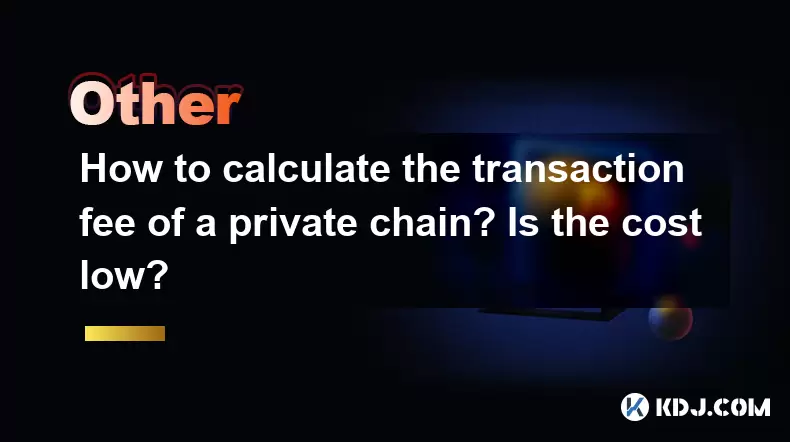
How to calculate the transaction fee of a private chain? Is the cost low?
May 16,2025 at 05:14am
How to Calculate the Transaction Fee of a Private Chain? Is the Cost Low? In the world of cryptocurrencies, understanding the transaction fees associated with different types of blockchains, including private chains, is crucial for users and developers alike. A private chain, also known as a permissioned blockchain, is a blockchain network where access ...
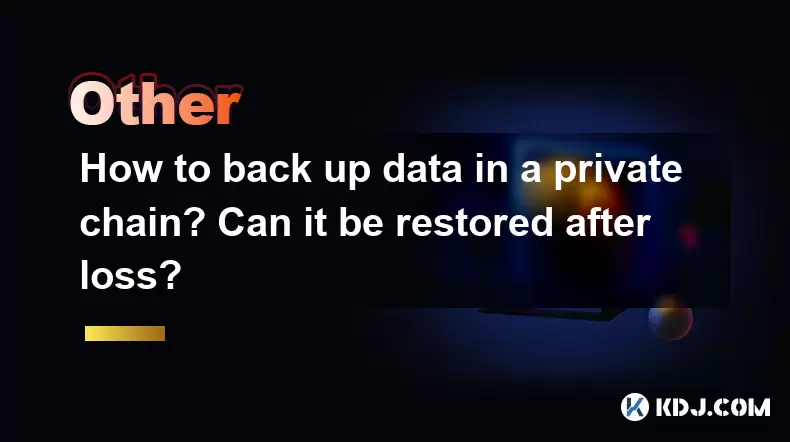
How to back up data in a private chain? Can it be restored after loss?
May 16,2025 at 12:36pm
Introduction to Private Chain Data BackupBacking up data in a private chain is crucial for maintaining the integrity and continuity of your blockchain operations. Private chains, also known as permissioned blockchains, are used by organizations to ensure data privacy and control over network participants. In this article, we will explore the methods for...
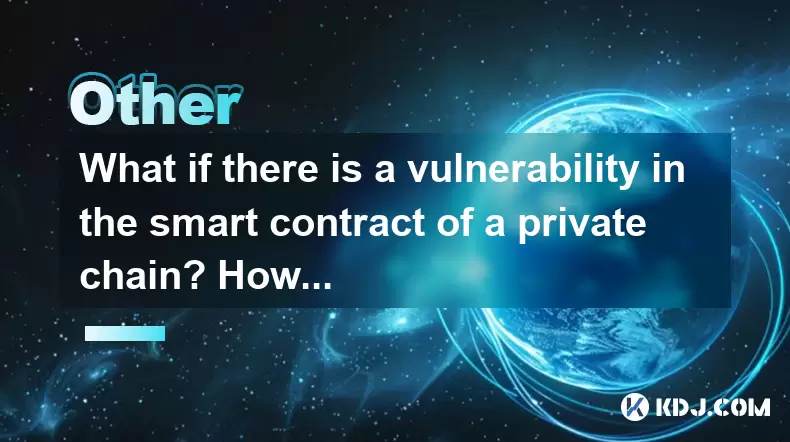
What if there is a vulnerability in the smart contract of a private chain? How to fix it?
May 15,2025 at 08:02pm
Introduction to Smart Contract Vulnerabilities in Private ChainsSmart contracts are self-executing programs that run on blockchain technology, designed to automate transactions and enforce agreements. While they offer numerous benefits, such as transparency and immutability, they are not immune to vulnerabilities. When a vulnerability is found in the sm...
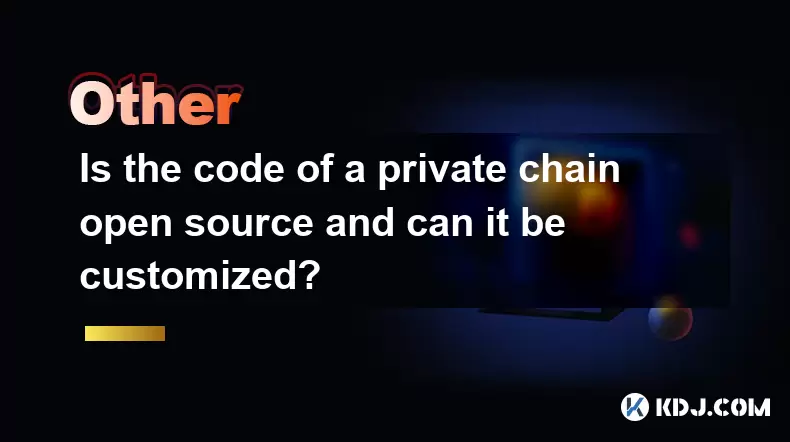
Is the code of a private chain open source and can it be customized?
May 15,2025 at 09:49pm
In the world of cryptocurrencies and blockchain technology, private chains or permissioned blockchains have become a topic of interest for many enterprises and organizations. A private chain is a blockchain network where access is restricted to a specific group of participants, as opposed to public blockchains like Bitcoin and Ethereum, which are open t...
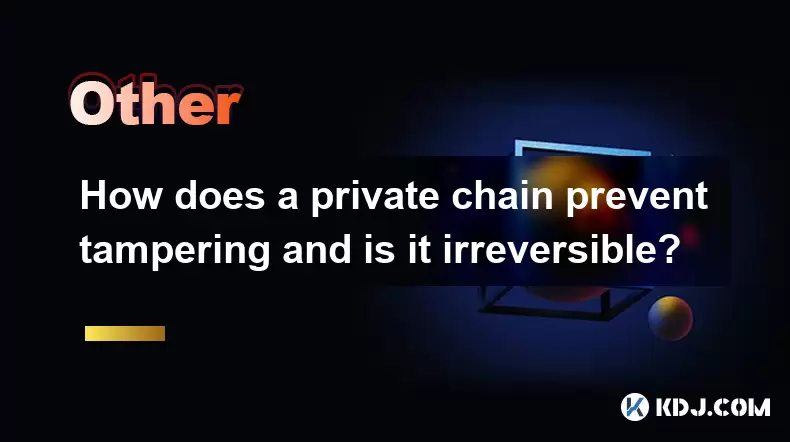
How does a private chain prevent tampering and is it irreversible?
May 17,2025 at 03:01am
Understanding Private ChainsA private chain is a type of blockchain network where access and participation are restricted to a select group of participants. Unlike public blockchains, which are open to anyone, private chains are typically used by organizations or consortia to maintain privacy and control over their transactions and data. This structure ...
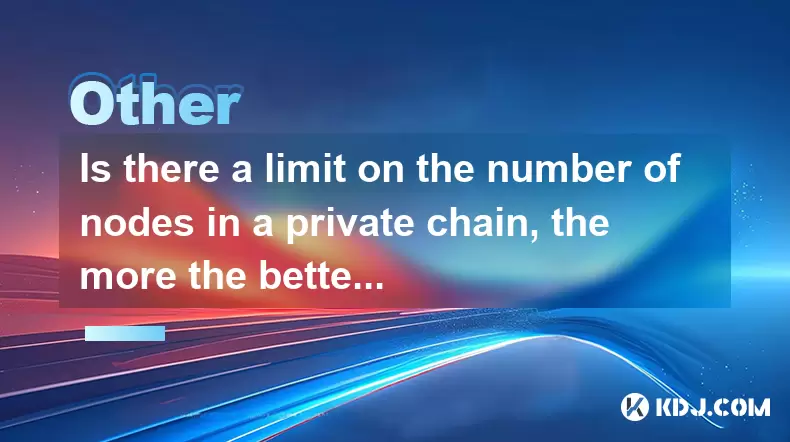
Is there a limit on the number of nodes in a private chain, the more the better?
May 17,2025 at 11:57pm
Understanding Private Chains and Node LimitsIn the world of cryptocurrencies, private chains, also known as permissioned blockchains, are networks where access is restricted to a select group of participants. One of the key components of any blockchain, including private chains, is the node. Nodes are essentially computers that maintain a copy of the bl...

How to calculate the transaction fee of a private chain? Is the cost low?
May 16,2025 at 05:14am
How to Calculate the Transaction Fee of a Private Chain? Is the Cost Low? In the world of cryptocurrencies, understanding the transaction fees associated with different types of blockchains, including private chains, is crucial for users and developers alike. A private chain, also known as a permissioned blockchain, is a blockchain network where access ...

How to back up data in a private chain? Can it be restored after loss?
May 16,2025 at 12:36pm
Introduction to Private Chain Data BackupBacking up data in a private chain is crucial for maintaining the integrity and continuity of your blockchain operations. Private chains, also known as permissioned blockchains, are used by organizations to ensure data privacy and control over network participants. In this article, we will explore the methods for...

What if there is a vulnerability in the smart contract of a private chain? How to fix it?
May 15,2025 at 08:02pm
Introduction to Smart Contract Vulnerabilities in Private ChainsSmart contracts are self-executing programs that run on blockchain technology, designed to automate transactions and enforce agreements. While they offer numerous benefits, such as transparency and immutability, they are not immune to vulnerabilities. When a vulnerability is found in the sm...

Is the code of a private chain open source and can it be customized?
May 15,2025 at 09:49pm
In the world of cryptocurrencies and blockchain technology, private chains or permissioned blockchains have become a topic of interest for many enterprises and organizations. A private chain is a blockchain network where access is restricted to a specific group of participants, as opposed to public blockchains like Bitcoin and Ethereum, which are open t...

How does a private chain prevent tampering and is it irreversible?
May 17,2025 at 03:01am
Understanding Private ChainsA private chain is a type of blockchain network where access and participation are restricted to a select group of participants. Unlike public blockchains, which are open to anyone, private chains are typically used by organizations or consortia to maintain privacy and control over their transactions and data. This structure ...

Is there a limit on the number of nodes in a private chain, the more the better?
May 17,2025 at 11:57pm
Understanding Private Chains and Node LimitsIn the world of cryptocurrencies, private chains, also known as permissioned blockchains, are networks where access is restricted to a select group of participants. One of the key components of any blockchain, including private chains, is the node. Nodes are essentially computers that maintain a copy of the bl...
See all articles






















